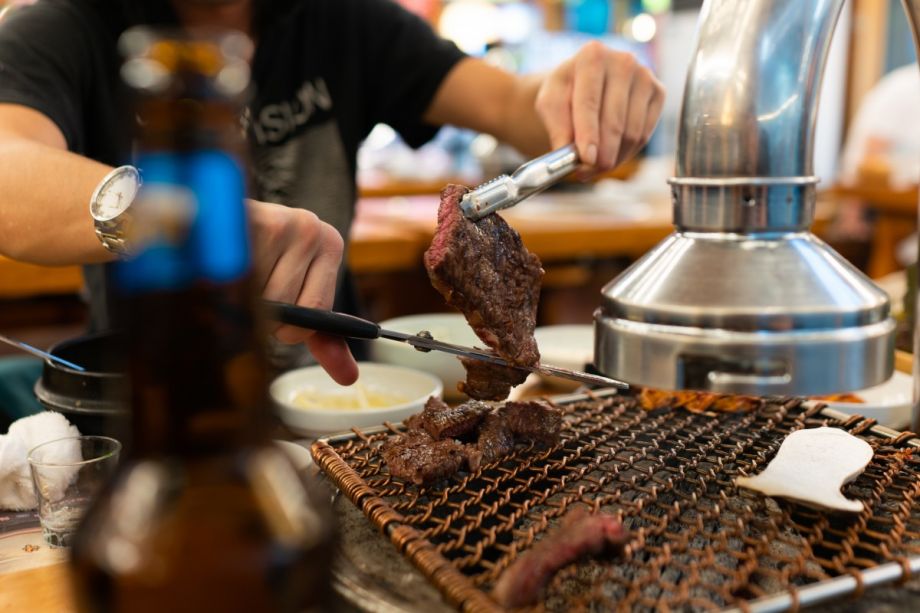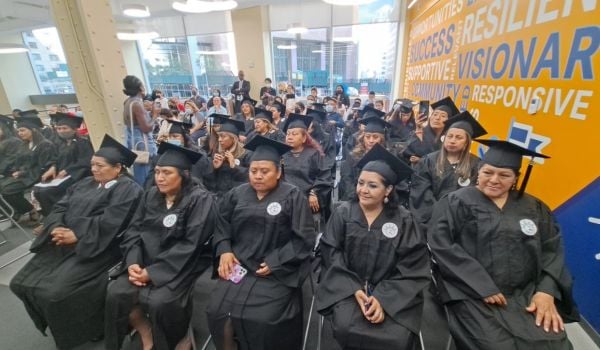In 2017, workers at Los Angeles’ Genwa Korean BBQ began to notice irregularities on their pay stubs when their wages didn’t reflect the hours they worked. At Genwa’s upscale restaurants, where the “A course” for two patrons starts at $125, workers began to suspect their employers weren’t sharing the wealth.
Jenny Kim, a server at the time, brought up her concerns with management when she discovered discrepancies – discrepancies that she estimated cost her $50,000, Kim told the L.A. Times. When management tried to silence her, she knew where to seek help. Born and raised in Koreatown, Los Angeles, Kim knew of the Korean Immigrant Workers Alliance (KIWA), a grassroots organization that reaches out to low-wage workers to provide them with educational and legal resources on labor issues.
After years of organizing, in June, workers at Genwa became the first Korean BBQ restaurant chain – and the first privately-owned Korean restaurant – in the country to unionize. Worker’s rights advocates say there are lessons to be gleaned from Genwa employees’ “groundbreaking” efforts, which are part of a wave of successful labor rights activism in L.A. and around the country.
“The only thing that stands between the tyranny of running a business with no regard for workers’ rights and the workers is a union,” says José Hernandez, director of organizing at KIWA and president of Genwa’s workers’ union.
Genwa’s workforce is a mix of migrant and domestic workers, including native Spanish, English and Korean speakers – but language wasn’t a barrier when KIWA began to organize workers. Rebecca Nathan, who started serving at Genwa in 2018, remembers KIWA’s meetings were often hosted in different languages, with translation services provided through an earpiece to bridge communication gaps.
With the help of KIWA, workers filed claims for sexual harassment, wage theft and lack of meal and rest breaks. And in 2020, the California Labor Commissioner’s Office fined the owners of Genwa over $2 million for labor law violations.
This was during the pandemic as Genwa struggled to stay open and laid off many of its employees. Many were concerned that the burden of the fine would permanently shut their doors and that the class action lawsuit would be for naught. Nathan said they negotiated to see if the state would bring down the fine if the owners would agree to a stipulation that would allow future employees to unionize.
“We’ll take less money if you let your workers organize and you let us help them do that,” Nathan remembers saying to the owners. “So that’s what we did. We started going to the restaurants, started talking to the individual employees, explained to them – this is what a union is, [this is] what it does, I’ll help you.”
Last year, the Genwa’s union was formally recognized when workers voted overwhelmingly in favor of unionizing, with Kent Wong, director of the UCLA Labor Center and founding president of the Asian Pacific American Labor Alliance, and the newly elected council member Nithya Raman serving as the validating third party.
The union was able to negotiate for what Nathan describes as not just a living wage, but a thriving wage that accounts for retirement benefits and vacation and sick time off of work. As part of the new union contract, staff leadership is also mandated to take courses on sexuality and gender diversity – Nathan had experienced discrimination because of her queerness and was outed in the workplace – as well as sexual harassment prevention.
There are several barriers to unionizing a restaurant. First, the turnover rate in the restaurant industry is one of the highest, around 75%, which prevents workers from staying long enough to establish a sense of trust and comradery.
After leaving her job, Nathan remembers picketing alongside KIWA outside Genwa’s locations and trying to educate apprehensive workers of their rights.
At Genwa, Kim describes a workplace environment where the owners tried to instill a sense of family pride amongst their employees, to create loyalty and trust. But she said it was ultimately a ploy to prevent workers like herself from speaking up about mistreatment and exploitation.
And in the instances that individuals do speak up, the fear of retaliation prevents many from raising any grievances, says Hernandez. (This could be why current Genwa workers were reluctant to speak to Next City about their current contract win.)
“The retaliation will come,” he says. “The promotion will come. The firings will come. The changing of chefs will come. Changing of assignments will come and that’s how they run these things almost to the ground. And people lose interest because they have to provide food for their families.”
As an added complication, Genwa workers were unionizing during the pandemic, at a moment when businesses and workers alike were feeling the brunt of economic losses. But Saba Waheed, research director at the UCLA Labor Center who studies low-wage workers, said the pandemic also shifted our culture around work.
“There was a great awakening that happened with the pandemic,” says Waheed. “Like thinking about the folks who were keeping our cities and our neighborhoods running were largely these low paying jobs, low wage jobs, low wage industries.”
And the heightened awareness, she said, brought visibility and dignity to the work that often gets stigmatized as lacking skill or expertise. While Genwa’s chain only spans three restaurants, its employees are part of a rising tide of workers who are making demands across Southern California and the country.
While there are policies that seek to enforce minimum wage laws and prevent wage theft, it’s still prevalent in low-wage jobs. While the minimum wage in California is $16.04, more than twice the federal minimum wage of $7.25, wage theft is still prevalent. In 2017, the Economic Policy Institute found throughout 10 of the most populous states, 17% of low-wage workers are affected by wage theft. For the Californian worker being impacted, this comes out to $3,400 in yearly stolen wages.
Often, raising the minimum wage doesn’t address these concerns directly, and Hernandez says it can lead to other side effects — employers might dock your hours but still expect you to complete a task in a shorter period of time which can lead to worse working conditions. This is just one example of how policies can fail to meet the needs of workers.
From sex workers in North Hollywood to Starbucks employees in Long Beach, unions are forming and pushing for increased wages and better benefits as inflation is rising and the cost of living bears down on L.A. locals.
Waheed describes an information network that’s spreading amongst workers who talk about successful and failed attempts at unionizing.
“They’re all sharing their strategies with each other,” says Waheed. “And they’re all creating models that are getting replicated: some of them old school union organizing, some of them built coming out of a new generation of workers.”
While anecdotally Waheed has heard of young people leading local unionizations efforts, definitive studies are still scant. But what is certain is that today’s younger generations hold much more favorable views of unions.
Nathan herself is a millennial. She says she’s observing a generational shift with Gen Z,who are more vocal about workplace equity and less eager to fall in line with toxic workplace values. Deloitte’s Global 2022 Gen Z and Millennial Survey found that almost half of Gen Z and millennials live paycheck to paycheck and a third of them worry about financial instability.
“So many of us have had to work terrible jobs, and sacrifice sleep, dignity, opportunities, family, etc., just for the sake of making ends meet and we are tired of it,” Nathan says. “I think older generations firstly started out in a job market that was not nearly so rough, but secondly are just more inclined to accept the status quo of professionalism.”
Hernandez argues that unions and collective bargaining correct the imbalance in the current market where businesses are dominating over individual employees. KIWA’s goal, he says, is to inspire other local retail and restaurant industries to also unionize. There have been whisperings that local Korean supermarkets are next.
“If we want to have a more productive relationship in a sustainable industry, we have to make sure that workers have access to unions,” Hernandez says. “That is the permanent solution.”
This article is part of The Bottom Line, a series exploring scalable solutions for problems related to affordability, inclusive economic growth and access to capital. Click here to subscribe to our Bottom Line newsletter.
Jireh Deng is a queer Taiwanese/Hong Konger American poet and journalist born and raised in the San Gabriel Valley.


















